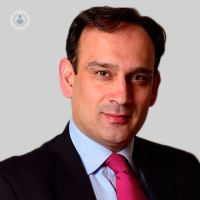7 tips for reducing stress
Written by:Stress is widely seen as a common condition, one that is a result of increasingly busy and fast-paced modern lifestyles. Stress can be useful in motivating you to achieve goals, but if it gets out of hand, it can become a serious problem. Leading psychiatrist and expert in executive stress, Dr Rajeev Dhar, gives you a rundown of causes of stress, and how we can better manage it.

What causes stress?
Stress is the body’s natural response to a high-pressure situation. Stress can be useful in some situations as adrenaline and noradrenaline are released into the body, making the person more alert. However, stress can also have many negative effects, such as high blood pressure, heart attacks, obesity, and a weakening of the immune system. It can also cause mental health problems such as anxiety, panic attacks, lack of sleep, and depression. If stress is not treated correctly, it can develop into something more significant such as depression, anxiety, disorders. If you are feeling that stress is becoming too much for you, it is essential to go through a thorough assessment with a specialist.
How can I manage stress better?
Sometimes it can feel that things are getting on top of you. Some tips to help create a less stressful environment, or to help you cope if you are starting to feel overwhelmed:
-
Try to have a good work-life balance
It is important to find the right balance between your work commitments and your personal life. Setting aside time to forget about work is really important to help you disconnect from the stress-causing workloads that are occupying your mind. It can be difficult to forget about that important piece of work you have to do, and can be tempting to work in your free time, but these are all clear ways of causing more stress later down the line.
To help you forget about work for the evening, why not visit a friend or your family? Read that book that you’ve been wanting to get into for so long, or just go for a walk. These are all simple ways to help you forget about work for a few hours and relax, helping you to feel re-energised the next day. Here are 6 tips to getting a good work-life balance
-
Manage your time better
Often the cause of stress can be a feeling that you don’t have enough time to do all of the important things you have to do. Time management skills such as making lists, prioritising your tasks, and working out your goals are ways of managing your time better.
Here are some tips for managing your time better.
-
Recognise the causes of stress
Mindfulness is an important skill to develop in the battle against stress. Recognising that you may be harbouring negative thoughts, or worrying about things that are beyond your control are ways of being more mindful and eliminating some of the causes of stress.
Addressing the causes of stress is really important too. If you have relationship, work, or financial problems it’s important to take control and work towards solving the problem, no matter how daunting this may feel, to help conquer the cause of stress.
-
Think of stress positively
Recognising that stress is a natural response to help you better deal with a difficult situation can help with your positive thinking, and not letting the stress get on top of you. Stress helps improve your memory, improve focus and even boost your immune system, but only to a certain level.
Too much stress has negative effects in all these areas. Here is a great talk on how to make stress your friend.
-
Be active
Getting enough physical exercise is important to build up the strength to better deal with stress, and to help you clear your thoughts. Exercise releases endorphins which fight stress, and make you feel more content.
Exercise doesn’t have to be expensive, with running, cycling or going for a long walk all free ways of getting exercise. Here are some simple tips to help you introduce a little more activity to your day.
-
Look after yourself
Keeping yourself physically healthy is very important for all manner of reasons, not only in managing stress. Making sure you sleep between 7-8 hours per night, eating healthily and cutting down on caffeine, smoking and alcohol intake will help to clear your mind and manage the symptoms of stress better. If you're not sure how to start improving your health, here are 8 simple tips to get you on the way.
-
Have fun at work!
Finally, making sure you have a little fun at work will really help to relieve the pressure of your workload. Finding a few minutes at times through the day to talk and share a joke with your colleagues will help you to escape the bubble of your workload for a moment, and get some enjoyment from your job.
If you would like to know more about stress management, or if you think you are struggling to cope, you can book an appointment with one of our specialists. Executive stress can easily develop into a more serious condition such as depression, anxiety and panic disorders, and is crucial to have assessment with a specialist if you feel that things are getting too much.



